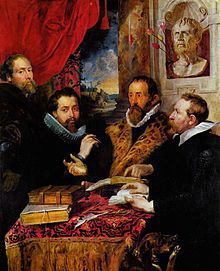Justus Lipsius
Here Lipsius remained for two years, devoting his spare time to the study of the Latin classics, collecting inscriptions and examining manuscripts in the Vatican.
In 1570 he travelled through Burgundy, Germany, Austria, and Bohemia, where the University of Jena engaged him as a teacher for more than a year, a position which implied conformity to the Lutheran Church.
He then returned to Leuven, but the Eighty Years' War soon drove him to take refuge via Antwerp to the Northern Netherlands, where, in 1579, the newly founded University of Leiden appointed him professor of history.
One of this latter class was a treatise on politics (Politicorum Libri Sex, 1589), in which he showed that, though a public teacher in a country which professed toleration, he had not departed from the state maxims of Alva and Philip II.
This avowal exposed him to attacks, but the prudent authorities of Leiden saved him, by prevailing upon him to publish a declaration that his expression Ure, seca ("Burn and cut") was a metaphor for a vigorous treatment.
The German historian Gerhard Oestreich has argued that Lipsius's ideas about the ideal citizen, a man who acts according to reason, is answerable to himself, is in control of his emotions, and is ready to fight, had found wide acceptance in the turbulent times of the Reformation.
The Lipsian view, translated to politics, would have been at the basis of rationalisation of the state and its apparatus of government, autocratic rule by the prince, discipline dispensed to subjects, and strong military defence.


